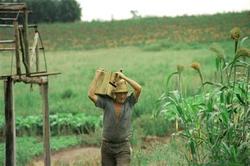Prices for Brazil's big farms slide on foreign ownership restrictions
Alastair Stewart
South America Correspondent
The Brazilian government's controversial decision to block major foreign land purchases from August 2010 was expected to cause farmland prices to slide across the board. That didn't happen as local farmers, buoyed by record commodity prices and bumper crops, stepped into the breach, buying land and forcing prices higher.
However, a deeper look at the farmland market reveals the rule change had a very real impact. According to a survey compiled by Commercial Properties, a local realtor, while farmland prices have risen overall, prices for lots larger than 3,000 hectares (7,400 acres) have fallen by 10% or more over the past year, depending on the region.
In Cascavel, western Parana, the price for prime lots has dropped 14% to 25,000 reals per hectare ($5,850 per acre), while prices in Luis Eduardo Magalhaes, western Bahia, have dropped 19% over the last 12 months.
In Riberao Preto, the center of Brazil's sugarcane industry in northwestern Sao Paulo, the average price for prime mega lots has dipped 16% to R$32,000 per hectare ($7,500 per acre).
The only major farming regions where prices for large lots have risen are northern Mato Grosso (32%) and Mato Grosso do Sul ( 27%).
The apparent contradiction can be explained by the level of foreign participation in the respective regions.
Western Bahia was the focus of much foreign investment in soybean and grains during the second half of the last decade, while western Parana was the venue for numerous foreign-backed forestry projects until the land rules changed (Brazil accounted for 60% of the world's forestry investments in 2009).
In contrast, Brazilian farmers in the center-west states of Mato Grosso and Mato Grosso do Sul have the scale, and the resources after a couple of bumper years, to make these larger purchases and the market for large lots remained liquid there.
When purchases of under 7,400 acres, the overwhelming majority, are included, prices have risen by 5% to 10% in the past 12 months, according to Informa FNP, a local farm consultancy.
Foreigners were free to buy however much farmland they pleased for 12 years up to 2010 when the government limited new purchase to medium-sized lots amid concerns about interest in large tracts by Chinese state grain firms and sovereign wealth funds. The rules were intended to limit purchases but had the effect of stalling nearly all investments due to the legal uncertainties they created. The government has promised to refine the rules to allow 'productive investments' by foreigners by the end of the year, but most expect this process will take longer.
When the rules are refined, allowing foreigners to define their farm investment strategies, the big farm market will become much more liquid and prices will rise significantly, experts say.
SLC Agricola, one of Brazil's largest farmers, is taking advantage of this window of opportunity. It has gone on a farm-buying spree over the last two months, acquiring over 66,000 acres in the northeastern state of Piaui and is in negotiations to buy a further 72,000 acres in Mato Grosso.
According to Arlindo Moura, SLC's CEO, prices for large lots will likely explode once the terms under which foreigners can acquire stakes in farmland are established.
Alastair Stewart can be reached at [email protected]













